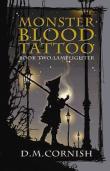 2972263261205270451.jpg
2972263261205270451.jpg
 2972263261205270451.jpg
2972263261205270451.jpg
"Rossamund Bookchild is finally becoming a lamplighter. Sworn into the Emperors service, his duty is to light the lamps along the Emperor's highways, and protect all travellers from the ferocious bogles that live in the wild. But he's found it no easier to fit in with the lamplighters than he ever has - always too small and too meek, his loneliness continues no matter how hard he tries to succeed. But when a haughty young girl, a member of a suspiciously-regarded society of all women teratologists is forced upon the lamplighters for training, Rossamund might no longer be the most despised soul around." (Source: Series website)
 "Surviving" Adolescence : Apocalyptic and Post-Apocalyptic Transformations In Young Adult Fiction
Kelvin Grove
:
2010
Z1761971
2010
single work
thesis
"Surviving" Adolescence : Apocalyptic and Post-Apocalyptic Transformations In Young Adult Fiction
Kelvin Grove
:
2010
Z1761971
2010
single work
thesis
'This study, entitled "Surviving" Adolescence: Apocalyptic and post-apocalyptic transformations in young adult fiction", analyses how discourses surrounding the apocalyptic and post-apocalyptic are represented in selected young adult fiction published between 1997 and 2009. The term ―apocalypse‖ is used by current theorists to refer to an uncovering or disclosure (most often a truth), and post-apocalypse means to be after a disclosure, after a revelation, or after catastrophe.
'This study offers a double reading of apocalyptic and post-apocalyptic discourses, and the dialectical tensions that are inherent in, and arise from, these discourses. Drawing on the current scholarship of children‘s and young adult literature this thesis uses post-structural theoretical perspectives to develop a framework and methodology for conducting a close textual analysis of exclusion, un-differentiation, prophecy, and simulacra of death. The combined theoretical perspectives and methodology offer new contributions to young adult fiction scholarship.
'This thesis finds that rather than conceiving adolescence as the endurance of a passing phase of a young person‘s life, there is a new trend emerging in young adult fiction that treats adolescence as a space of transformation essential to the survival of the young adult, and his/her community.'
Source: QUT ePrints.
 "Surviving" Adolescence : Apocalyptic and Post-Apocalyptic Transformations In Young Adult Fiction
Kelvin Grove
:
2010
Z1761971
2010
single work
thesis
"Surviving" Adolescence : Apocalyptic and Post-Apocalyptic Transformations In Young Adult Fiction
Kelvin Grove
:
2010
Z1761971
2010
single work
thesis
'This study, entitled "Surviving" Adolescence: Apocalyptic and post-apocalyptic transformations in young adult fiction", analyses how discourses surrounding the apocalyptic and post-apocalyptic are represented in selected young adult fiction published between 1997 and 2009. The term ―apocalypse‖ is used by current theorists to refer to an uncovering or disclosure (most often a truth), and post-apocalypse means to be after a disclosure, after a revelation, or after catastrophe.
'This study offers a double reading of apocalyptic and post-apocalyptic discourses, and the dialectical tensions that are inherent in, and arise from, these discourses. Drawing on the current scholarship of children‘s and young adult literature this thesis uses post-structural theoretical perspectives to develop a framework and methodology for conducting a close textual analysis of exclusion, un-differentiation, prophecy, and simulacra of death. The combined theoretical perspectives and methodology offer new contributions to young adult fiction scholarship.
'This thesis finds that rather than conceiving adolescence as the endurance of a passing phase of a young person‘s life, there is a new trend emerging in young adult fiction that treats adolescence as a space of transformation essential to the survival of the young adult, and his/her community.'
Source: QUT ePrints.